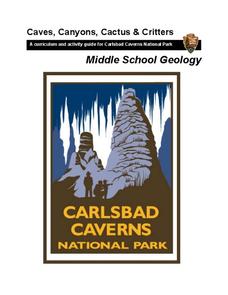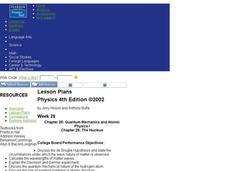Columbus City Schools
To Measure its Mass or Volume?
Atoms, elements, and molecules, oh my! Teaching the fundamentals of chemistry to curious sixth graders has never been easier to accomplish. Here is a resource that pulls together everything needed to get them off to a good start,...
Columbus City Schools
You Can’t Sneeze On This Tissue
Take your class' understanding of cells to the next level... or levels! Demonstrate the levels of organization using a variety of engaging methods. The teacher's guide includes the materials you'll need to execute a flower...
Columbus City Schools
Let’s Get Theoretical About Cells
Get up close and personal with cells in a hands-on journey to discover what makes up living things. Scholars learn valuable microscope skills, delve into the Modern Cell Theory, and gain insight into how cells reproduce. The included lab...
Steinhardt Apps
Kinetic Molecular Theory
Building off young chemists' knowledge of the states of matter, kinetic molecular theory is the focus of the unit. Eight days of lessons including multiple demonstrations, one lab experiment, directed instruction, and worksheets,...
Columbus City Schools
Photosynthesis and Respiration
Thirty percent of the world's oxygen is produced by rainforests found throughout the world. Seventh grade learners explore the processes of photosynthesis and respiration through 10 days of labs, manipulatives, and discussions. They...
National Park Service
Caves, Canyons, Cactus, and Critters
Mother Nature's Gravel Company is open for business! The unit includes four lessons covering weathering and erosion. Experiments are simple to complete and young geologists compare notes to see who makes the biggest ice...
Curated OER
Quantum Mechanics and Atomic Physics
Students will discuss the de Brogile Hypothesis and state the circumstances under which the wave nature of matter is observed. They will also calculate the wavelengths of matter waves.
Lawrence Berkeley National Laboratory
Berkeley Lab: The Particle Adventure: Wavelength, the Cave
This analogy story explains the manner in which the wavelength of light affects the maximum resolution of a microscope.
CK-12 Foundation
Ck 12: Biology: Laboratories
[Free Registration/Login may be required to access all resource tools.] Describes a scientific laboratory, lab equipment, and lab safety.
Department of Defense
Do Dea: Biology: Unit 3: Cell Structure
In this third unit of a Biology course, students learn about cells and cell structure. They compare prokaryotic and eukaryotic cells and learn about the specialized structures in a cell and what their functions are. They will also learn...
Science Education Resource Center at Carleton College
Serc: Asbestos Hazard Assessment
This interactive site introduces students to concepts related to asbestos and how geologists analyze asbestos in building materials. The site is divided into three components: the geology of asbestos, identifying asbestos in the lab, and...
Other popular searches
- Label Compound Microscope
- Label a Compound Microscope
- Letter E Microscope Lab
- Microscope Lab Activities
- Label Microscope Parts
- Light Microscope Lab
- Microscope Lab Rubric
- Electron Microscope Lab
- Blood Cells Microscope Lab
- Blood Microscope Lab
- Letter E Microscope Lab
- Biology Microscope Lab










